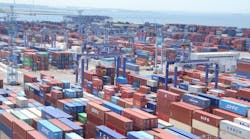Japan's Largest Port Shut Down By Ransomware Attack
If Toyota Motor Corp. had plans to ship auto parts on Wednesday, cyberattackers put the kibosh on that by shutting down the Port of Nagoya, Japan's largest port, from which Toyota also exports most of its vehicles.
Nikkei Asia reports that a system glitch preventing container loading and unloading effectively shut the port down on Wednesday. Police reported that cyberattackers made a ransom demand in exchange for system recovery, with the message delivered off a printer at the port.
BleepingComputer reports the cyberattack took place around 6:30 a.m. on July 4 and the ransomware infection was identified in a meeting between the Nagoya Port Operation Association Terminal Committee and Aichi Prefectural Police Headquarters.
LockBit, a hacker group based in Russia, claimed responsibility for the attack.
Toyota on Thursday announced plans to suspend a packaging line for components for export, and that the auto manufacturer will decide whether to restart the line based on the state of port operations. Containers at the port began moving again on Thursday evening.
“The ever-evolving, persistent threat of ransomware attacks emphasizes the continued need for organizations to implement a proactive and comprehensive approach to cybersecurity," says James McQuiggan, security awareness advocate at cybersecurity firm KnowBe4.
"As organizations increase the interconnectivity of critical systems and the potential implications of disruptions, it becomes clear that relying solely on reactive measures is no longer sufficient. Businesses and governments must stay ahead of cybercriminals by investing in advanced threat detection technologies, regularly assessing vulnerabilities, and fostering a solid cybersecurity culture within their organizations," McQuiggan adds.
About the Author
Dennis Scimeca
Dennis Scimeca is a veteran technology journalist with particular experience in vision system technology, machine learning/artificial intelligence, and augmented/mixed/virtual reality (XR), with bylines in consumer, developer, and B2B outlets.
At IndustryWeek, he covers the competitive advantages gained by manufacturers that deploy proven technologies. If you would like to share your story with IndustryWeek, please contact Dennis at [email protected].

